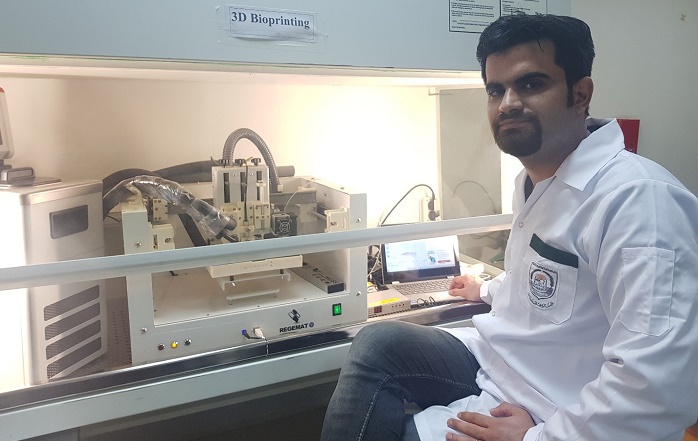
Muscat: A new bandage-type dressing for wounds, which has been made from plants, could be used to help them heal faster, a researcher in Oman has discovered.
Saied Vakilian, a researcher at the Laboratory for Stem Cell and Regenerative Medicine at the Natural and Medical Sciences Research Centre at the University of Nizwa, led a team that used compounds made from two medicinal plants to help wounds heal faster.
The project was among those that won at the latest edition of the National Research Award, organised by the Ministry of Higher Education, Research, and Innovation (MOHERI)
“This winning project aimed to evaluate a bioactive multilayer wound dressing based on chitosan and alginate,” said Vakilian.
“To enhance healing potential, dracaena cinnabari and aloe vera were loaded as separate layers into the scaffold. The bare and bioactive multilayered scaffolds were fabricated by an iterative layering freeze-drying technique.”
Following topographical, chemical, and physical assessment, the performance of the scaffolds was evaluated in vitro and in vivo. The results revealed adequate attachment and proliferation of human foreskin fibroblasts, indicating excellent biocompatibility of the bioactive scaffold.
The wounds treated with the bioactive scaffold exhibited superior hypergranulation, fibroblast maturation, epithelisation, and collagen deposition, with minimal inflammation and crust formation. The synergism of extracellular matrix-mimicking multi-layered scaffolding could be considered a supportive wound dressing.
“A nature-derived bioactive multilayered scaffold, based on chitosan and alginate, has been represented as a nature-derived wound dressing in this study,” explained Vakilian. “This multilayered scaffold was loaded with dracaena cinnabari and aloe vera in separate layers to improve wound treatment and prevent further complications.
“This study represents a new and versatile class of nature-derived scaffolds as wound dressing that hold clinical promise in serving the community,” he added. “The performance of this bioactive scaffold could improve the wound healing in comparison to a known commercial dressing. This study represents a practical and alternative nature-derived wound dresser, addressing several challenges involving in chronic wound healing.
“Due to the biocompatible nature of this bioactive wound dresser, it can be used in clinical trials for human chronic wounds upon obtaining required ethical approvals,” he added. “Nevertheless, the fabrication process of the wound dresser required more optimisation in the reproducibility of large-scale production.”
Sharing his thoughts about his project winning the National Research Award for 2021, Vakilian stated: “It was a great pleasure to receive such an award from the Ministry of Higher Education, Research and Innovation. Such events motivate us to continue high quality research with clinical and pharmaceutical applications.
“This distinguished event with the attendance of key people from different sectors encouraged me to further work on research with higher impact in health services,” he added. “As a researcher and an expert in the field, I would like to draw attention to the potential available in the field of tissue engineering and regenerative medicine.”